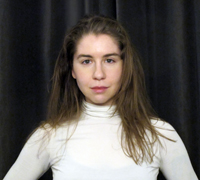
CIPS CONNECTIONS
Podcast/Video Interviews by Stephen IbarakiA Chat with Claudia Escuillié: Mathematics; Physics; Architecture; Philosophy
This week, Stephen Ibaraki has an exclusive interview with Claudia Escuillié.
 Claudia Escuillié, 28, born in France, currently living between Bordeaux and Paris.
Claudia Escuillié, 28, born in France, currently living between Bordeaux and Paris.
I aspire to be hired to tackle intricate problems. While I have had the opportunity to employ various areas of knowledge, I find myself most at ease when I can utilize mathematics and physics in a project, as these tools feel innate to me, allowing me to unleash my creativity. I wish to apply these skills within a corporate setting, joining a team working on moonshot projects - a dream job for me.
From the age of six, I had a resolute desire to overthrow all conventions of my upbringing and forge my own path. This decision was clear, and I followed through with observations, deductions, experiments, and vivid visualizations of the systems I comprehended. My goal has been to re-demonstrate everything I learn and, evidently, to make a complete network of knowledge.
Employing these skills, I developed a habit of undertaking substantial personal projects, later incorporating scientific knowledge into my toolbox. This practice continues to thrive, as I initiate a new project every few years.
Despite my deep fascination with theoretical science, I pivoted to architecture school after high school. This decision stemmed from a naive desire to lead my own hands-on projects and have the resources to do so. For years, I had been self-educating across various subjects, ensuring that my findings provided depth, complexity, and accuracy beyond typical university curricula. While architecture textbooks held little interest for me, as my focus remained on scientific learning, the architecture program equipped me with invaluable soft skills. Through a substantial workload, challenges, and exposure to the harsh realities of project management, I gained complete autonomy in determining project relevance and promotion strategies.
My dream was to attend a scientific school that would allow students, no matter how abstract or theoretical their interests, to learn primarily through long-term projects and experiments. Unfortunately, the French education system had been entirely opposed to this approach, and I had not encountered any options that catered to my needs.
Today, I am investing time in obtaining degrees in mathematics and physics, as a diploma is a necessary credential to demonstrate abilities for collaborative projects, and it also provides an excellent opportunity for knowledge acquisition. Additionally, I am pursuing a philosophy degree as a fulfilling use of my spare time.
I look forward to doing more.